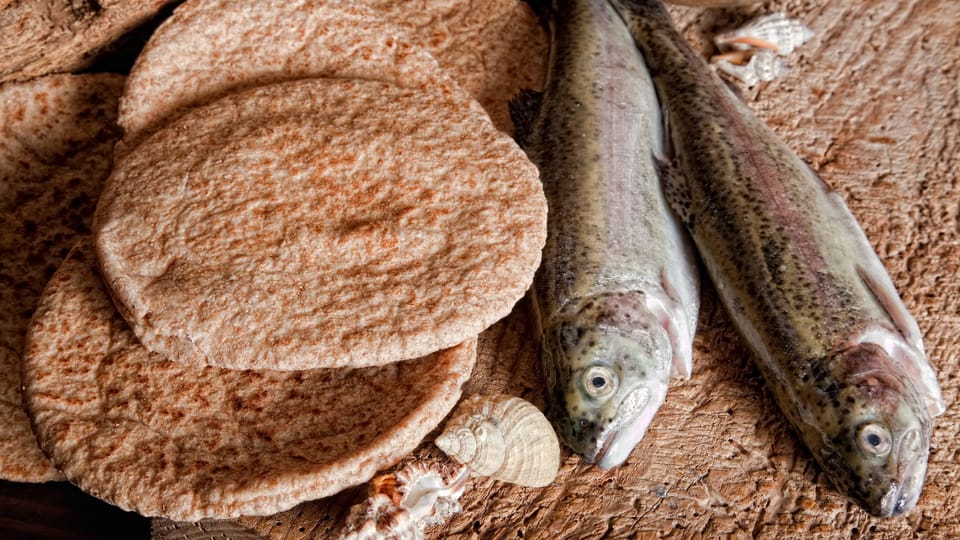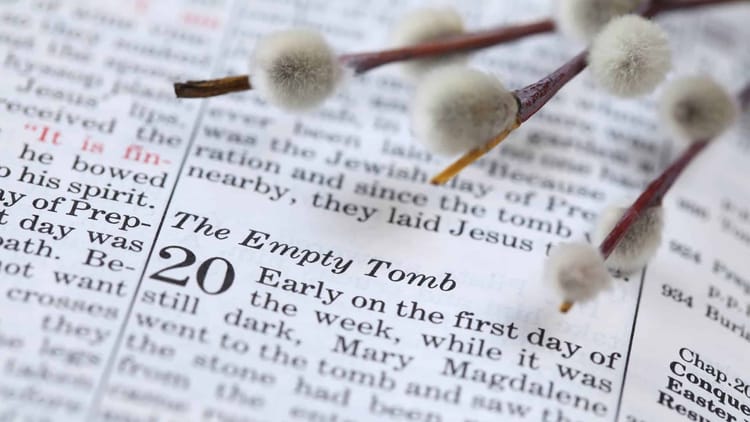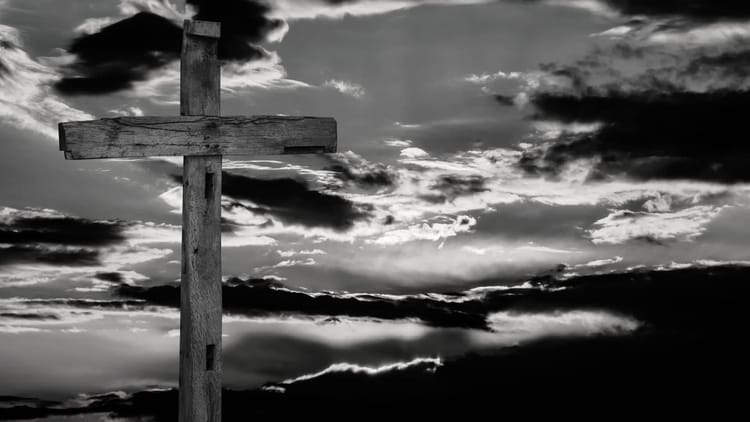When You Want More (John 6:1-15, 25-71)

Big Idea: Only Jesus can truly satisfy our deepest longings and fill the hunger in our souls.
What is it that you want more of in life? Who here would like more time? I would. I would love to be a kid again. The days stretched on endlessly. You tell a kid to wait a day, and it’s like you’re telling them forever. Now, it seems like I just sit down after preaching, and I’m back here again. I’ve got magazines and books I’d love to read, things I’d like to do. I would love to have more time.
Who here would like more money? Are you ever surprised by your bank balance when you go to the ATM? Wouldn’t it be nice to be surprised the right way? To feel like our money had multiplied when we weren’t looking?
There are lots of things we want more of, but think deeper for a second. There are things we want more of that we can’t put words to, at least not easily. I married a couple on Friday. I enjoy performing weddings because I get to see the couple's facial expressions up close. I watched their expressions on Friday, but I did so with mixed feelings. Every married couple will eventually feel a deep sense of disappointment, regardless of how good they are together. No husband, no wife, can meet all the complex needs or hungers of the soul. It’s impossible.
It’s the same at work. You may have a great career. It may be good a great deal of the time. But everybody, in every job, eventually longs for more. No matter what dream job you land, it’s still not enough.
I could name lots of things – hobbies, friends, kids, relationships. They’re all great, and there are moments in life that we feel satisfied. But there are also long periods in between in which we ask, “Is this all there is? There has got to be something more.”
Today’s story is going to speak to that need. We've been examining the seven signs Jesus performed in the Gospel of John. Signs are significant because they point to something. They are more than just past events. There’s a significance, a deeper meaning, behind each one of these stories.
Today's story is very important. It’s the only event that happened in Jesus’ life, apart from the last week of his life, that’s recorded in all four Gospels. It’s also a watershed moment in his life. Up until now, Jesus’ popularity had been on the increase. John 6:2 says, “And a huge crowd kept following him wherever he went, because they saw his miracles as he healed the sick.” After this event, his popularity took a nosedive. John 6:66 says, “From this time many of his disciples turned back and no longer followed him.” What we’re about to read was a pretty significant incident in the ministry of Jesus.
Let’s read what happened:
After this, Jesus crossed over the Sea of Galilee, also known as the Sea of Tiberias. And a huge crowd kept following him wherever he went, because they saw his miracles as he healed the sick. Then Jesus went up into the hills and sat down with his disciples around him. (It was nearly time for the annual Passover celebration.) Jesus soon saw a great crowd of people climbing the hill, looking for him. Turning to Philip, he asked, “Philip, where can we buy bread to feed all these people?” He was testing Philip, for he already knew what he was going to do. (John 6:1-6)
If you’ve been to Israel, you might have gone to where some think this happened. It's difficult to imagine over ten thousand people, including five thousand men, women, and children, gathering spontaneously to seek Jesus. It must have been staggering to watch. But you can’t begin to imagine the logistical problems surrounding a group of people that large. If you’ve ever had to plan a large event or cook for a large group, you know it just doesn’t happen by itself. Jesus turned to one of his disciples, Philip, who knew the area best, because he didn’t live too far away. It’s almost like he’s asking directions to the closest store. He had a deeper purpose, though. “He was testing Philip, for he already knew what he was going to do.”
That last verse makes me think. I sometimes wonder if God isn’t trying to teach us something when we have a shortfall of time, money, or some other resource. When I run out of money or when our church faced a deficit last year, I wonder if God is testing our response, even though He already knows His plans.
We tend to respond just like Philip did. “Philip replied, ‘It would take a small fortune to feed them!'” (John 6:7). We tend to look first to our own resources, which is fine. But our resources are seldom enough. Let’s stretch the need factor wider than providing a meal for over ten thousand, which we couldn’t pull off. Let’s make it more commonplace. We don’t have the resources for what we need – for breaking bad habits, for making our marriage what it should be, for many of the things we long for. A lot of us have found that our resources run out a lot sooner than we’d like them to. What do we do when they run out?
“Then Andrew, Simon Peter’s brother, spoke up. ‘There’s a young boy here with five barley loaves and two fish. But what good is that with this huge crowd?'” (John 6:8-9). What do you think of when you think of barley? No, not beer, and not soup. I mean barley bread. It sounds exotic, like one of those expensive breads you can buy at the bakery. Back then it was anything as exotic. Barley sold for a third of the price of wheat. An ancient writer said that barley products are “suited for irrational animals and people in unhappy circumstances.” Barley wasn’t really too great a treat, nor was there much – probably just five pita-size loaves. The fish wasn’t much better. It probably wasn’t fresh fish. More likely, it was pickled or dried. Andrew was right to see that this wouldn’t come close to feeding such a large crowd, but you have to give him credit for telling Jesus about it.
“Tell everyone to sit down,” Jesus ordered. So all of them-the men alone numbered five thousand-sat down on the grassy slopes. Then Jesus took the loaves, gave thanks to God, and passed them out to the people. Afterward he did the same with the fish. And they all ate until they were full. “Now gather the leftovers,” Jesus told his disciples, “so that nothing is wasted.” There were only five barley loaves to start with, but twelve baskets were filled with the pieces of bread the people did not eat! (John 6:10-13)
Jesus had everyone sit, which was a very good idea since a crowd that large could easily begin to stampede for food. He took the bread, and gave thanks, perhaps using the common Jewish prayer: “Blessed are you, O Lord our God, King of the universe, who brings forth bread from the earth.” And then, without fanfare, he began to distribute the food. I don’t know when people realized that a miracle had taken place, but it soon became clear that they weren’t running out of food, no matter how much had been passed out. There was no question that something had happened.
“When the people saw this miraculous sign, they exclaimed, ‘Surely, he is the Prophet we have been expecting!’ Jesus saw that they were ready to take him by force and make him king, so he went higher into the hills alone” (John 6:14-15). Why do you think people assumed that Jesus was the prophet they had been expecting? We find out later in the chapter:
You must show us a miraculous sign if you want us to believe in you. What will you do for us? After all, our ancestors ate manna while they journeyed through the wilderness! As the Scriptures say, “Moses gave them bread from heaven to eat.” (John 6:30-31)
Both Moses and Elisha had fed a crowd miraculously. People assumed that when the Messiah came, he would perform the same miracle. In fact, they were a little disappointed with the miracle Jesus performed. Moses fed hundreds of thousands, perhaps millions; Jesus only fed about ten thousand. It was enough that people followed Jesus, but they still wanted more proof. Jesus used this as a teaching opportunity to point to a deeper need beyond any miraculous provision of food that he could provide.
We have bodies that get hungry, but we also have souls that get hungry. We look for everything in life to fill that hunger. We occasionally feel full, but the feeling doesn’t last. We long for that feeling that we occasionally get when we eat at a really nice restaurant – the feeling of being full, but not stuffed; of having enjoyed an incredible meal and leaving with just the right feeling. We long for that feeling in life, but we can’t seem to maintain it. Sometimes we can’t even seem to get it for a fleeting moment, no matter how hard we try.
In 1987, U2 came out with the song “I Still Haven’t Found What I’m Looking For.” That’s how we feel, isn’t it? We know there’s more, and we want more, but we can’t seem to get it.
Is it possible that the hunger in our souls is pointing us to something deeper? It’s pointing us to the solution, to what will ultimately fill our souls. The solution is a person. It’s Jesus.
Jesus said, “I assure you, Moses didn’t give them bread from heaven. My Father did. And now he offers you the true bread from heaven. The true bread of God is the one who comes down from heaven and gives life to the world.”
“Sir,” they said, “give us that bread every day of our lives.”
Jesus replied, “I am the bread of life. No one who comes to me will ever be hungry again. Those who believe in me will never thirst. (John 6:32-35)
That’s the message for today. What we want, what we need, what we lack, may just be pointing us to our deepest need, our deepest hunger. It may be pointing us to Jesus.
What does this mean? It means that we ultimately won’t find what we’re looking for in all the usual places. We won’t find it in our marriages, our jobs, our kids, our hobbies, or our relationships, no matter how hard we try. That doesn’t mean they’re bad. They’re good, and should be enjoyed. It just means that they won’t fill the deepest hunger in our soul.
It also means that church isn’t the answer. The solution to this hunger isn’t religion. It’s God. Churches are useful, but only when they bring people into an encounter with Jesus, the bread of life. We can’t fill anyone’s hunger, but we know who can. You may have left church empty and disappointed. That may not be your fault. Churches should be about people who are so full of the presence of Jesus that when you meet them, you meet Jesus. Our church is only as good as our ability to help people encounter Jesus.
It also means that our devotions may not cut it. If you were raised in a church, you may have been taught to do devotions a certain way. It usually involves a certain amount of reading and prayer, maybe some other things. Anybody ever finished their devotions and still felt hungry? It’s not enough to do devotions. We need to encounter Jesus and be fed by him.
It’s not something that can be met by our own resources. The people asked Jesus, “What does God want us to do?” (John 6:28). But it’s not something that we do. It’s ultimately a relationship that we enter into. “Jesus told them, ‘This is what God wants you to do: Believe in the one he has sent'” (John 6:29). Jesus provided it for us at great cost. We’re invited to receive it. “I am the living bread that came down out of heaven. Anyone who eats this bread will live forever; this bread is my flesh, offered so the world may live” (John 6:51).
Gordon and Gail MacDonald once wrote a book called If Those Who Reach Could Touch. It’s about our longing to connect in relationships, and it hints at the fact that our longing to connect doesn’t always translate into an actual connection. There may be a lot of us today who would like to reach out and be fed by this living bread. We want this connection with Jesus. We’re tired of going through the motions. We want to be full.
Jesus is more than willing to respond. He’s already provided what you need. It’s not about religion, or about keeping a set of rules. It’s about entering into a relationship with him, or of re-establishing that relationship with him. It’s about taking time to listen and to connect, to sit down and stop long enough to feast on the bread that he offers.
“Look! Here I stand at the door and knock. If you hear me calling and open the door, I will come in, and we will share a meal as friends” (Revelation 3:20). Last week, Charlene decided she needed a day away from the kids, the phone, and from everything else – including me! – to be fed by Jesus. She went away for a day to a place she wouldn’t be disturbed. I’m due for the same. You may be as well. One of the smartest things we could do is to go home and schedule a day, perhaps just half a day, to be fed in our souls. It’s time to stop looking elsewhere. It’s time to be fed by Jesus.
God’s invitation:
Come, all you who are thirsty,
come to the waters;
and you who have no money,
come, buy and eat!
Come, buy wine and milk
without money and without cost.
Why spend money on what is not bread,
and your labor on what does not satisfy?
Listen, listen to me, and eat what is good,
and your soul will delight in the richest of fare…
Seek the LORD while he may be found;
call on him while he is near. (Isaiah 58:1-2, 6)
Our response:
As the deer pants for streams of water,
so I long for you, O God.
I thirst for God, the living God.
When can I come and stand before him? (Psalm 42:1-2)





